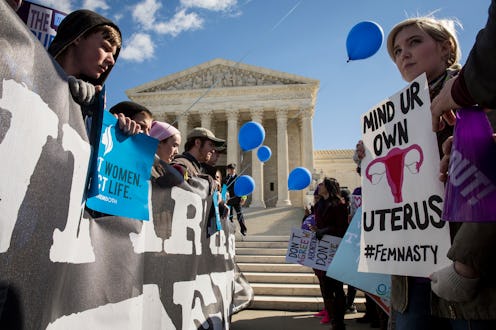News
Why Trump's Next SCOTUS Pick Could Wreck Your Access To Safe & Legal Abortion

Justice Anthony Kennedy’s decision to leave the Supreme Court means a lot more for women than you might think. Soon after he announced his impending retirement on Wednesday, pro-choice groups sprung into action, vowing to do everything possible to protect Roe v. Wade. With President Trump poised to pick an anti-abortion nominee to replace Kennedy, what is the actual likelihood that abortion laws in the U.S. will change?
In Roe v. Wade, justices ruled 7-2 in favor of a woman’s right to choose, thanks to the right to privacy established under the due process clause of the 14th Amendment. Although there have been significant restrictions to Roe v. Wade over the past 40 years, Whole Woman’s Health v. Hellerstedt in 2016 and Planned Parenthood v. Casey in 1992 established that women must not face an undue burden when pursuing their legal right to an abortion.
Kennedy was the crucial vote in both of those cases. In Casey, “instead of voting to overturn Roe v. Wade as some feared, Kennedy helped cement a woman’s right to make her own decisions about continuing or ending a pregnancy,” Nancy Northup, the president and CEO of the Center for Reproductive Rights, tells Bustle. This decision affirmed Kennedy’s overall support for Roe v. Wade.
What Could Happen To Roe V. Wade?
It’s unlikely Kennedy's successor will vote similarly in future challenges to Roe. President Trump has vowed to nominate anti-choice justices to the Supreme Court in a bid to overturn the landmark ruling.
However, it’ll be harder to overturn Roe v. Wade, thanks to a legal principle known as stare decisis. Fordham law professor Clare Huntington calls it "a bedrock principle of our law."
"[It's] the idea that when something’s decided — for a constitutional decision, especially — you don’t revisit it," Huntington tells Bustle. "That’s not a conservative principle, that’s a fundamental legal principle. But it is certainly something that conservatives feel very strongly about."
As such, overturning Roe v. Wade would "cut against everything that the judiciary, but particularly conservative judges and justices, stand for."
Huntington believes it’s much more likely that the court will just pass more restrictions on abortion rights. Although Whole Woman’s Health confirmed the decision made in Casey that undue burdens shall not be placed on women seeking abortions, Huntington notes that the definition of "undue burden" is subjective — and it's the justices who decide what does and doesn't qualify.
"What is an undue burden? That’s fundamentally a question of judgement," Huntington says. "It'll probably still be the law. The question is, how do you apply it?" Huntington says that a more conservative Supreme Court would be less likely to rule that any given abortion restriction constitutes an "undue burden."
It Might Come Down To State Law
More restrictions on Roe v. Wade, as opposed to its complete overturn, would still leave little for pro-choice activists to celebrate. “The threat to people’s health and rights in the near future is very real,” Emma Dulaney, a spokeswoman for Planned Parenthood Action Fund, tells Bustle.
If Roe were to be overturned, it wouldn't mean abortion is illegal right away; that would only happen if Congress then passed a law outlawing abortion, which would be a steep lift even in a GOP-controlled Congress. Rather, the repeal of Roe would allow states, for the first time since Roe, to pass laws that outlaw abortion.
"In conservative states, they’d have more leeway to severely or, ultimately, completely curtail access to abortion," Huntington says. "In more liberal states, particularly where [Democrats] control the statehouse, control the legislature, they’ll be able to protect a woman’s right."
But it's also worth noting that several states have already passed laws that automatically "kick in" if Roe is repealed. In Louisiana, Mississippi, North Dakota, and South Dakota, abortion will automatically become illegal the moment Roe is repealed, per state law.
Similarly, 10 states still have pre-Roe abortion bans on the books; these laws are currently unenforceable thanks to Roe, but they'll become the law of the land if Roe is overturned. Those states are Alabama, Arkansas, Arizona, Massachusetts, Michigan, Mississippi, New Mexico, Oklahoma, West Virginia and Wisconsin — although some of them, particularly those that have become more liberal since the 1970s, would likely pass laws legalizing the practice if Roe were repealed.
On the flipside, California, Connecticut, Delaware, Hawaii, Maine, Maryland, Nevada, and Washington have all passed laws that will protect a woman's right to choose even if Roe does get repealed.
Who Would This Affect?
Huntington says low-income women would be hurt the most by overturning Roe, as it would be difficult — or even impossible for them to travel to places where abortion remained legal and accessible.
"It's going to be women who don't have the means to travel. We saw this in Ireland," Huntington says, referring to Ireland's recent vote to abolish the country's constitutional ban on abortion. Before the referendum, women in Ireland had to travel to England to get an abortion.
"It's not that people don't have abortions; it's that people will have to travel farther, it'll be more expensive — there's a whole parade of horribles that you could imagine that would flow," Huntington adds. "But basically, as with many of these policies, the people who will be hurt the most will be low-income women, who already don't have a lot of choices."
Despite the political polarization surrounding abortion, polls show seven in 10 Americans actually oppose overturning Roe. “The stakes of the coming nomination fight are extraordinary," Northup says. "The future of reproductive rights is on the line."
Seth Millstein contributed to this report.